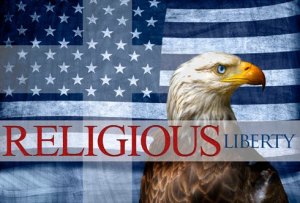Photo credit: Catholicfire.blogspot.com
By Rick Plasterer
In a previous blog post, I reviewed one of two important lines of attack on religious freedom in contemporary America covered at a presentation by the Family Research Council on February 20, that pertaining to the HHS contraceptive/abortifacient mandate, which is certainly the controversy most in the public light. But there is another, less publicized but at least as important, spearheaded by homosexual activists, to penalize those who will not facilitate homosexual behavior, and ultimately to mandate acceptance of homosexuality. Kellie Fiedorik of the Alliance Defending Freedom spoke on this attack at the same FRC presentation. This basically involves the destruction of personal liberty of conscience in professional and business life caused by government mandated acceptance of the sexual revolution in the name of civil rights.
Fiedorik quoted the famous Scottish athlete Eric Liddell, who, accused of impertinence because he refused to run on Sunday, declared “the impertinence lies, sir, with those who seek to influence a man to deny his beliefs.” Noting that religious freedom was foundational to America, she also quoted Jefferson, as saying “no provision in our constitution ought to be dearer to man than that which protects the right of conscience from the enterprises of civil authority.”
As Fiedorik noted, public accommodation civil rights laws designed or expanded to include sexual orientation are being interpreted to mean not only that homosexuals may not be refused service, but also may not be refused services the provider believes are immoral. The result is that increasingly, religious Americans are “persecuted … have faced legal action … have lost their jobs” because they refused to violate their consciences and accommodate what they believe to be sin. A number of high profile cases prove this. Elaine Huguenin, a New Mexico photographer, was fined $7,000 for respectfully refusing to photograph a lesbian ceremony in a case so far lost, but still on appeal. In Colorado a same sex couple sued a baker who refused to bake a cake celebrating their relationship. Like the New Mexico couple, they obtained their desired service elsewhere, but still sued the objecting Christian merchant. Similarly a counselor in Georgia declined to counsel a same sex couple on their relationship problems, referring them instead to other counseling, which they found to be “excellent,” but still sued the religious provider who as a result can no longer be a counselor in Georgia. Another case in California involved a lesbian couple seeking artificial insemination, who successfully sued an objecting provider even after they obtained the service elsewhere.
Against the claims that these attempts to exercise liberty of conscience are “discriminatory,” Fiedorik noted no one would question them if the service requested was deemed to express reactionary ideas. People would not “expect an African-American photographer to take a picture of a family in the KKK … [wearing] long white robes and pointy hats,” nor would a Jewish baker be expected to bake a cake with swastikas that says “happy birthday to Hitler.”
The legal offensive to penalize those who disagree with the sexual revolution is one of religious freedom’s “largest threats,” according to Fiedorick. Citing a Becket Fund amicus brief to the Supreme Court, she said that “97% of religious adherents in the United States and more than half of the entire population, an estimated 160 million Americans, belong to religious bodies that have a clear definition and affirm that marriage is between one man and one woman.” While what might be considered cooperation with sin may vary from one person to another, these millions of Americans “are the ones being marginalized … Our fellow Americans are being given a choice that no one should have to face, either violate your conscience, or face legal action and lose your job.”
Religious organizations as well find they cannot exercise the right of liberty of conscience in the public square. A Methodist camp meeting association in New Jersey was successfully sued by a lesbian couple because they were refused rental of the association’s facilities for their ceremony, and in several cases that Fiedorik considers particularly “atrocious,” Catholic adoption agencies in a number of jurisdictions have had to close because they will not comply with the state’s requirement to provide children to homosexual couples.
“These punishments will likely grow more frequent and more severe as the sexual liberty agenda advances,” Fiedorik said, “which is why we must stand firmly for religious freedom … and defend every person, every American’s right to worship and to live their lives according to the dictates of their conscience.”
The disturbing direction of law and public policy, and certainly the objective of the Obama Administration, is to redefine religious freedom as the right to perform religious ceremonies in a house of worship. Against this, Fiedorik quotes Martin Luther King: “A church that has no impact outside its four walls, and stands silent in the face of immorality, is an irrelevant social club, not the life changing and even culture changing institution God commanded it to be.”
It is in the nature of religious obligation that it may not be declined by the believer regardless of the penalty, or the prospects for freedom, but Fiedorik held out hope that perseverance in the struggle for religious freedom will bear fruit. “Each one of us can work to change the culture, and law follows culture, so there is hope.” We may yet be able to recover a society in which “each of us can live our lives according to our deepest convictions.”
No comments yet




